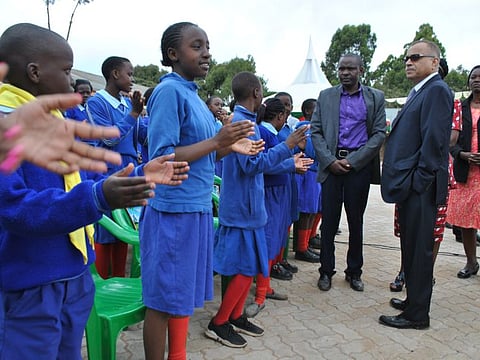Tristar CEO: Business isn’t just about turning a profit
Dubai-based logistics company is chasing an IPO and ESG principles with equal intensity

Also In This Package
Dubai: Dubai-based logistics company Tristar Group recently came up with a roadmap that will see it launch an IPO and get listed on Dubai Financial Market on April 22. This is only the second IPO in three years by a Dubai entity, which adds to its significance.
But Tristar wants to be known more than as a logistics and supply chain service provider, especially in the oil and gas sector. Its founder and CEO, Eugene Mayne, has been driving the company to take more ESG (environmental social and governance) themed projects for the greater good. Here, Mayne makes his point as to why it should matter for companies.
Gulf News: Tristar was built as a ‘business for purpose’, Where does ESG come in?
Eugene Mayne: We adopted an ESG framework to develop a long-term sustainability strategy for our business as we continue to grow over the next decade. As we operate in 21 countries and play a major role in local communities, we are committed to the Ten Principles of the United Nations Global Compact (UNGC), which focus on human rights, labour protection, environment and anti-corruption drives.
We take an active approach to address social issues, including access to education, clean water and good health in the communities where we operate, since becoming a signatory in 2011.
In 2019, we signed the Women Empowerment Principles, reaffirming our commitment towards diversity and gender equality. We have several women in leadership positions at Tristar, including on our board. We welcomed Dr Dalya Al Muthanna, the current president and CEO of GE Gulf, as one of our independent non-executive board members.
How do you ensure that your purpose and mission remain strong across all your operations?
We have a strong management team that oversees every aspect of our operations from a central hub in Dubai. We are equally committed to community impact projects in the UAE as we are in our markets in Africa and we made sure to support local communities in 2020 at the height of the pandemic.
We provided 51 tonnes of food items to South Sudan’s Ministry of Humanitarian Affairs and Disaster Management. Several volunteers from Tristar visited the Atek Luak Protection Centre in South Sudan to educate children on the pandemic. In Mali, we distributed food packs to 500 refugee families at the Camp of Faladie, Commune VI, District of Bamako. We also contributed $100,000 (Dh367,800) to Uganda’s National Response Fund.
Here, in the region, we managed the health and wellbeing of our 1,000-strong driver force during the pandemic without a single casualty or job loss.
How does ESG guide your business strategy?
We believe that our ESG strategy goes hand in hand with our business strategy and in fact is closely linked to our long-term growth. In the logistics industry, responsible business practices are no longer an option, rather a licence to operate.
There will be an accelerated shift towards prioritising renewable energy sources as climate change moves up the agenda for local and regional governments. Sustainability will be a key priority going forward. Given the far-reaching economic and social impact of the pandemic, the logistics industry could look to do their part in rebuilding a better future for the global economy.
Will you be looking at alliances to speed up this change?
Yes, very much so. As a logistics operator with several road transport assets, we believe it is our responsibility. In 2011, we partnered with Total and Dubai Police to deliver seminars on road safety to school children. The campaign reached approximately 5,000 children from 15 schools.
In 2014, we partnered Dubai’s Roads and Transport Authority (RTA) and United Kingdom-based Royal Society for the Prevention of Accidents (RoSPA) to develop and deliver a training programme for drivers of commercial, heavy-duty vehicles in the UAE. We partnered with RoSPA again in 2015 to conduct a campaign targeted at high school students, teaching them the principles of safely riding and driving cars.
What about your community-linked projects?
We believe that supporting the communities we operate in is integral to our success. To that effect, we have implemented several programmes in the UAE and the wider Gulf Cooperation Council as well as Africa. We take an active approach to address social issues such as access to quality education and provision of clean water. These issues are part of the 17 UN Sustainable Development Goals (SDGs).
We have built and supported two schools in South Sudan, one in Yapa village, and one in Juba, while supporting the education of several students via scholarships and sponsorship of examination fees. In Kenya, we sponsored the education and housing of two orphans who have been given the opportunity to pursue their secondary school education.
In 2020, we co-sponsored the construction of a nursery school and a child health centre in Boali — a town in the Central African Republic. The purpose of the facility is to promote access to basic education for children in preparation for primary school.
In line with the UN SDG No 6 on Clean Water and Sanitation, we constructed sanitary facilities for a school in Kenya with more than 2,000 students and 50 teachers. We also donated borewells for internally-displaced persons (IDPs) in South Sudan and a water tank to the ‘Mission De La Charite’ or Mother Teresa Centre in Kinshasa, DRC.
How do you apply these principles internally?
In addition to regular safety training for drivers and ground staff, we implemented programmes to upskill them by teaching English language and internet skills. We have a ‘Happiness and Staff Wellness Committee’ that oversees activities pertaining to employee engagement as well as their overall happiness and health within the workspace.









